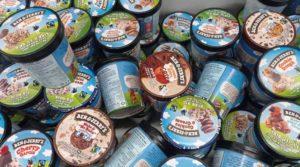
The year 2021 has not been a good one for Israel sentiment among famous people.
Ever since the latest Israeli-Palestinian conflict in May, many international celebrities have voiced their support for the Palestinian people.
The latest conflict started after Palestinians protested an expected Supreme Court of Israel decision that would evict Palestinian families from an eastern Jerusalem neighborhood. The neighborhood, Sheikh Jarrah, is contested.
International law claims it belongs to the Palestinians. But Israel has asserted sovereignty over the territory since conquering it during the arguably defensive Six-Day War in 1967.
Most pro-Palestinian celebrities in 2021 haven’t explained that history in their comments. They have just made the comments.
Earlier this month, Irish writer Sally Rooney became the latest notable person to jump on the anti-Israel bandwagon. In a statement, the best-selling author announced that she wouldn’t allow her third novel, “Beautiful World, Where are You?”, to be published in Hebrew.
Rooney said her decision was based on her support for the boycott, divestment and sanctions movement.
In her statement, she described BDS as a movement “calling for an economic and cultural boycott of complicit Israeli companies and institutions in response to the apartheid system and other grave human rights violations.”
“It is modeled on the economic and cultural boycott that helped to end apartheid in South Africa,” Rooney added.
By cutting out the Israeli market, the author joined a bandwagon that already included two American Jews: Ben Cohen and Jerry Greenfield, the founders of Ben & Jerry’s Ice Cream.
Ben and Jerry no longer own or operate the company, having sold it to Unilever in 2000. But they are still the names attached to the brand and, in July, they supported its decision to stop selling ice cream in contested Israeli territories.
“We believe it is inconsistent with our values for Ben & Jerry’s ice cream to be sold in the Occupied Palestinian Territory,” the company said in a statement.
Despite an intense backlash, Ben and Jerry doubled down on Unilever’s decision in a recent interview with Axios on HBO.
“Ben & Jerry’s and Unilever are being characterized as boycotting Israel, which is not the case at all. It’s not boycotting Israel in any way,” Greenfield explained in that conversation.
But most celebrities criticized Israel during the conflict in the spring.
And it was English comedian John Oliver, on a May episode of his HBO show “Last Week Tonight,” who arguably led the charge.
Oliver said that, for decades, the United States’ position has been that we’re a friend to Israel. He added that he hoped a real friend would tell him when he’s doing something wrong. And definitely when he’s “committing a war crime.”
Around the same time, U.S. supermodels Gigi and Bella Hadid called Israel “oppressors.” English “Game of Thrones” star Lena Headey referred to Israel’s actions as “ethnic cleansing.” U.S. actor Mark Ruffalo said “it’s time for sanctions on Israel to free Palestinians.”
English pop star Dua Lipa, U.S. pop star Halsey and U.S. actress Viola Davis also made similar comments.
These famous people have no real influence over the Israeli-Palestinian conflict and the global approach to handling it. But they do have millions of social media followers, and the cultural influence that comes with that.
“Young people are more in the mode of worshipping celebrities,” said Ken Jacobson, the deputy national director of the Anti-Defamation League.
“We see it in our young Jewish community,” he added. “Polls show a softening of support for Israel among young Jews.”
Such softening support could lead to more collegiate student bodies passing resolutions to support BDS, according to Jacobson. It also could influence the Democratic Party to drift further in the direction of extremist representatives, like Minnesota’s Ilhan Omar, who support the same movement.
But so far, according to Jacobson, we aren’t that far down that road. Most universities don’t support BDS, even after their students pass resolutions. And Omar remains in the minority of her party on Israel policy.
“But there are a whole host of worries that could manifest,” he said.
If they do, Jacobson added, they could erode the postwar U.S. consensus of support
for Israel.
To prevent that from happening, Jacobson thinks it’s important for young Jews to stop listening to celebrities on this issue.
“BDS is not about making Israel better,” he said. “It’s about making Israel disappear.”
[email protected]; 215-832-0740







These celebrities have no clue what they’re talking about. All of it is lies, fake history and hate